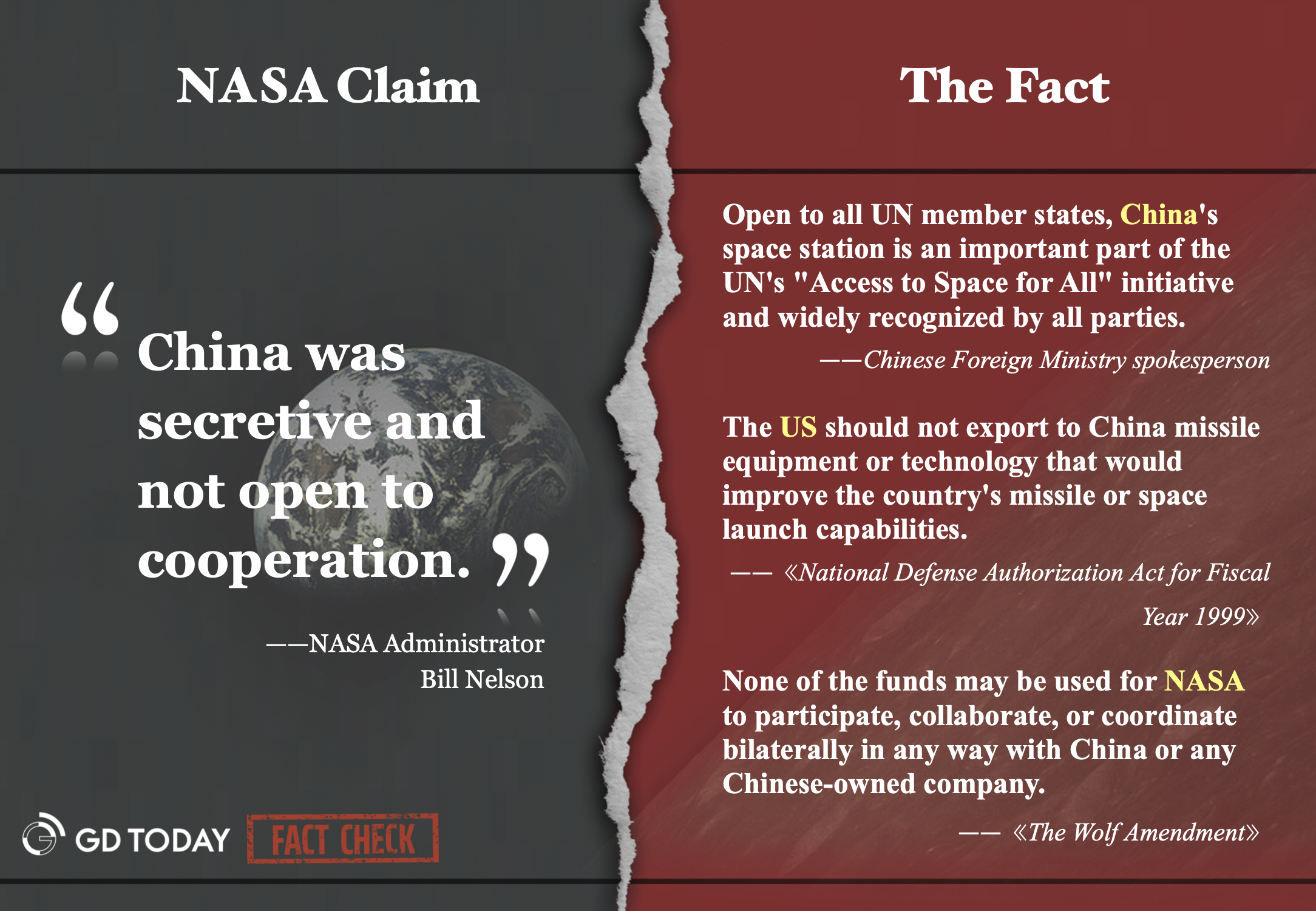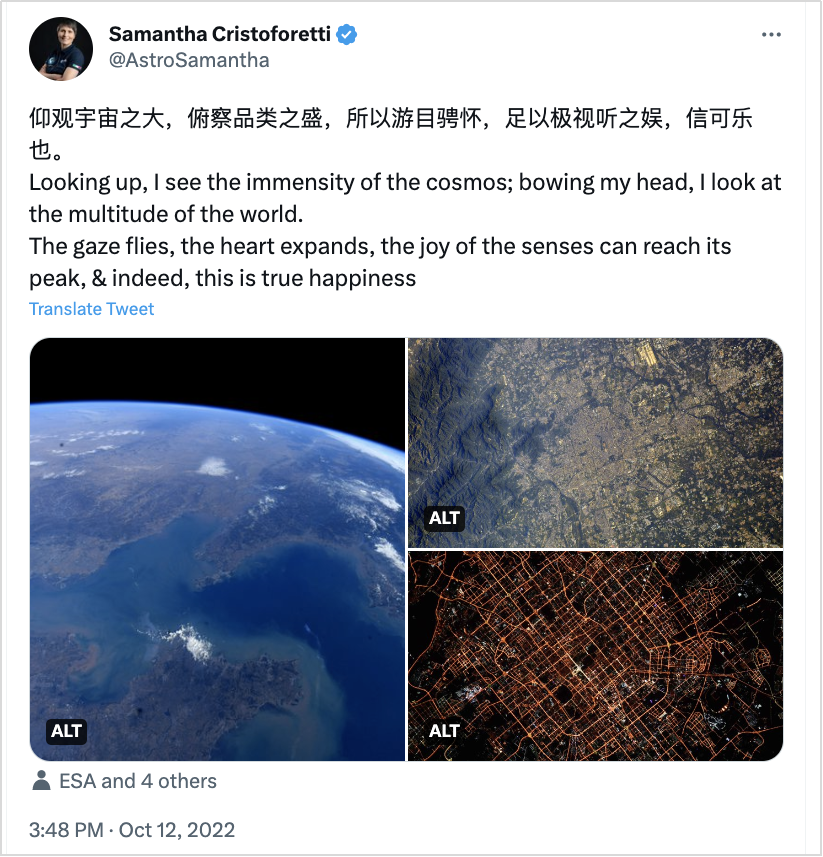Recently, China’s Shenzhou-15 astronauts returned to Earth with a smooth and safe landing after completing a six-month mission to the country’s space station. On May 30, China launched the Shenzhou-16 mission to its space station with three astronauts on board, marking another step forward for the nation’s space program.
The Associated Press claimed that China’s Shenzhou-16 mission is taking place against a backdrop of intensifying competition with the US for influence and leadership in the fields of technology, the military, and diplomacy.
In March 2023, Bill Nelson, the administrator of the National Aeronautics and Space Administration (NASA), stated in an interview with Axios that the China National Space Administration is neither cooperative nor transparent in the space field and poses a threat to other countries.
Are the “accusations” against China justified? Who is hindering China-US cooperation in the space domain? And who has repeatedly violated international rules and attempted to claim space resources for themselves?
The US has legislated to prohibit space cooperation with China
The US has closed the door to space cooperation with China through legislation and continuously suppressed and blocked the development of China’s aerospace technology.
As early as 1998, the US Congress passed the National Defense Authorization Act for Fiscal Year 1999, which explicitly prohibits the export of satellites to China. The relevant provisions stipulate that “the United States should not export to the People’s Republic of China missile equipment or technology that would improve the missile or space launch capabilities of the People’s Republic of China.”
Twelve years later, the US Congress enacted the Wolf Amendment in 2011, which prohibits any form of communication and cooperation between NASA and any government agency or enterprise in China. This means that Chinese astronauts are unable to participate in the construction and operation of the International Space Station and have no access to American spacecraft and equipment.

In addition, the US has repeatedly disrupted international rules for space cooperation, attempting to “privatize” space resources with a “first come, first serve” hegemonic mindset.
In April 2020, then-US President Donald Trump signed an executive order declaring that the US has the right to commercial exploitation, recovery, and utilization of space resources, refusing to recognize outer space as the common property of all nations, and attempting to violate the relevant principles of the Outer Space Treaty. The treaty states that “outer space, including the moon and other celestial bodies, shall not be subject to national appropriation by claim of sovereignty, by means of use or occupation, or by any other means.”
Trump’s executive order is still in effect and has been opposed by many governments and experts worldwide who consider it a challenge and infringement on international law and the principle of fairness. The Russian Federal Space Agency stated at the time that “Attempts to expropriate outer space and aggressive plans to actually seize territories of other planets hardly set countries (on course for) fruitful cooperation.” This executive order contradicts the concept that “space belongs to all of humanity.”
China’s doors for space cooperation have always been open
From the launch of the first test spaceship, Shenzhou-1, in 1999 to the recent Shenzhou-16 mission, China’s aerospace industry has been making progress through independent innovation against the backdrop of long-standing restrictions on equipment exports and technological blockades from the US.
At the end of 2022, China’s space station was fully established, becoming the second operational space station in the world after the International Space Station. The Chinese space station is open to all member states of the United Nations, and scientific experiment projects from 17 countries, including Germany, Italy, France, Spain, and Japan, have been selected. However, the US is unable to participate due to its own restrictions imposed by the Wolf Amendment.
Chinese-manufactured satellites have been exported to multiple countries, including Nigeria, Venezuela, Pakistan, and Belarus. At the same time, with the continuous improvement of China’s BeiDou navigation satellite system, data from the Gaofen-1 and Gaofen-6 satellites have been distributed freely worldwide, supporting global resource investigation and monitoring, environmental assessment, and earth science research.
Moreover, in 2017, the European Space Agency dispatched two astronauts to participate in space survival training organized by China. During the training, Italian astronaut Samantha Cristoforetti noted in Chinese in an interview, “This is the first opportunity for Chinese astronauts and European astronauts to train together in China. Our team collaboration has been smooth and excellent.”
In October 2022, Cristoforetti carried out a mission on the International Space Station, and when the space station flew over China, she quoted a famous line from the ancient Chinese text “Preface to the Orchid Pavilion Gathering” to describe the vast universe and the beauty of the Earth before her eyes.

Cristoforetti’s quote of a famous line from the ancient Chinese text “Preface to the Orchid Pavilion Gathering”
On June 1, Niklas Hedman, acting director of the United Nations Office for Outer Space Affairs, said in a media interview that China had made remarkable achievements in the field of space exploration, advancing space exploration into a new phase and making positive contributions to developing the capacity of emerging space-faring nations.
Author | Zhang Xiao (intern)
Poster designer | Zhang Xiao (intern)
Editor | Wing, Steven, Lydia Liu, James

















